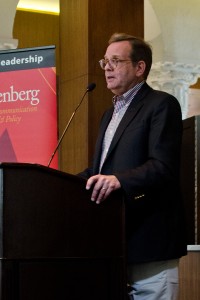Todd Purdum discusses his book at ’SC
Former Annenberg Dean Geoffrey Cowan invited acclaimed journalist Todd Purdum to celebrate the upcoming publication of Purdum’s latest book, An Idea Whose Time Has Come: Two Presidents, Two Parties and the Battle for the Civil Rights Act of 1964 at the University Club Thursday evening.

Keep it civil · Author and acclaimed journalist Todd Purdum discussed his new book with students at the University Club on Thursday evening. – Kirstin Louie | Daily Trojan
Purdum spoke about the major themes in his book, which analyzes the Civil Rights Act, passed 50 years ago.
“Before I started my research, I thought I knew a fair amount of the Civil Rights Act,” Purdum said. “But the broad outlines of what I thought I knew were only part of the story, and that was the less interesting part of the story.”
Purdum discussed the way in which the Civil Rights Act was passed, and the role of factors such as secrecy and an interfaith coalition. He also mentioned the role of key players preceding this time, notably Lyndon B. Johnson.
“I think what was so interesting about Johnson and what he does was that he was a contradiction,” said audience member Beverly Morgan-Sandoz. “He was a man from the South, deep in the southern traditions which were not pro-African American, and then it’s him who signs this legislation that finishes what Lincoln started.”
Purdum explained that what was most important about Johnson was his ability to restrain himself from intervening too much. He then stressed that there are many overlooked figures involved in the Civil Rights Movement.
“Some people are totally forgotten when it comes to this story,” he said. “For example, Representative William McCulloch. He was very conservative, but he said that if they promise not to water down the bill and give Republicans equal credit, he would bring the republicans along — and that’s exactly what he did.”
McCulloch was critical in forcing the Republicans to break the filibuster, but his role is not usually remembered.
About 30 audience members attended the event, participating in a Q&A session with Purdum.
“The book is a fascinating history of one of the most important pieces of social and political legislation,” said Michael Parks, director of the School of Journalism. “I covered some of this news as a journalist and when reading this, I learned things that are worth knowing as an object lesson for America today. Our current political system is so messed up that we need to look back in history, and the way things were done.”
Richard Reeves, a senior lecturer at Annenberg, noted he agreed with much of Purdum’s discussion.
“I think a good deal of Todd, and [I had] already read the book,” Reeves said. “We agree on a lot of things, particularly what he said about Kennedy’s 1963 speech was unique. The fact that the president would publicly side with the minority changed America.”
Michael Alexander, who runs a free concert series looking at the history of racism in Los Angeles, also attended the event out of interest for the topic.
“I am old enough to have lived through it,” he said. “I am worried that your generation is not as active as mine was.”
Alexander also spoke about the often-overlooked history of civil rights in Los Angeles.
“In 1950, my father sat in his car on alert because a black family moved north of Pico,” Alexander said. “I also remember the big issue when a black singer moved to Hancock Park. So L.A. is working towards a model of inclusiveness, but its history is tainted and not recognized.”
Editor’s note: This post has been updated.


That was Lyndon Johnson.
Andrew Johnson was Abraham Lincoln’s Vice President.
Both men did become president after a president was assassinated.
Andrew Johnson was the first POTUS to be impeached. The Senate acquitted him. He was later the only former POTUS to serve in the Senate.